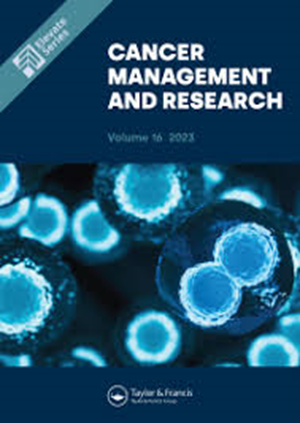The Efficiency and Safety of Triple-Drug Combination of Albumin-Bound Paclitaxel, Anlotinib and PD-1/L1 Inhibitors in the 2nd or Above Line of Advanced NSCLC: A Retrospective Cohort Study
IF 2.5
4区 医学
Q3 ONCOLOGY
引用次数: 0
Abstract
Background: Existing research data indicates that albumin-bound paclitaxel (nab-ptx), anlotinib, and PD-1/L1 inhibitors have individually shown efficacy in second-line and subsequent treatments for advanced non-small cell lung cancer (NSCLC). This study seeks to investigate the potential of an optimized treatment regimen in this context by combining these three drugs and evaluating both efficacy and safety outcomes.Patients and Methods: Between January 2020 and January 2022, we collected data from pre-treated advanced NSCLC patients who received a combination therapy of nab-ptx, anlotinib, and PD-1/L1 inhibitors as a second-line or later treatment. The primary endpoints for the study included the objective response rate (ORR), progression-free survival (PFS), disease control rate (DCR) and overall survival (OS), while adverse events (AEs) were also recorded.
Results: Our findings revealed that the ORR of this regimen in pretreated NSCLC patients was 35.71%, with mean PFS of 5.0 months and mean OS of 10.0 months. Further analysis suggested correlations between the efficacy of the regimen and factors such as PD-L1 expression levels, the occurrence of certain types of adverse events, and the status of NK cell activity. Additionally, the tolerable toxicity profile of this regimen indicates its potential applicability in the treatment of pretreated advanced NSCLC.
Conclusion: Our study displayed that triple-drug combination of nab-ptx, anlotinib and PD-1/L1 inhibitors showed promising efficiency and tolerated cytotoxicity in the 2nd or above line treatment of advanced NSCLC, indicating the potential of such regimen as an important option for second-line treatment of advanced NSCLC. However, due to limitations in patient numbers, its actual clinical value awaits further research confirmation.
白蛋白结合型紫杉醇、安罗替尼和 PD-1/L1 抑制剂三药联合用于晚期 NSCLC 二线或二线以上治疗的有效性和安全性:一项回顾性队列研究
研究背景现有研究数据表明,白蛋白结合型紫杉醇(nab-ptx)、安罗替尼和PD-1/L1抑制剂在晚期非小细胞肺癌(NSCLC)的二线及后续治疗中显示出了各自的疗效。本研究旨在通过联合使用这三种药物并评估疗效和安全性结果,研究在这种情况下优化治疗方案的潜力:2020年1月至2022年1月期间,我们收集了接受纳博-ptx、安罗替尼和PD-1/L1抑制剂联合治疗的晚期NSCLC患者的数据,作为二线或更后治疗方案。研究的主要终点包括客观反应率(ORR)、无进展生存期(PFS)、疾病控制率(DCR)和总生存期(OS),同时还记录了不良事件(AEs):结果:我们的研究结果表明,该疗法在NSCLC预处理患者中的ORR为35.71%,平均PFS为5.0个月,平均OS为10.0个月。进一步分析表明,该疗法的疗效与 PD-L1 表达水平、某些类型不良事件的发生以及 NK 细胞活性状况等因素相关。此外,该方案可耐受的毒性特征表明,它可能适用于治疗预处理的晚期NSCLC:我们的研究显示,纳博-ptx、安洛替尼和PD-1/L1抑制剂三药联合治疗晚期NSCLC二线或以上疗程显示出良好的疗效和可耐受的细胞毒性,表明该方案有望成为晚期NSCLC二线治疗的重要选择。然而,由于患者人数的限制,其实际临床价值还有待进一步研究证实。
本文章由计算机程序翻译,如有差异,请以英文原文为准。
求助全文
约1分钟内获得全文
求助全文
来源期刊

Cancer Management and Research
Medicine-Oncology
CiteScore
7.40
自引率
0.00%
发文量
448
审稿时长
16 weeks
期刊介绍:
Cancer Management and Research is an international, peer reviewed, open access journal focusing on cancer research and the optimal use of preventative and integrated treatment interventions to achieve improved outcomes, enhanced survival, and quality of life for cancer patients. Specific topics covered in the journal include:
◦Epidemiology, detection and screening
◦Cellular research and biomarkers
◦Identification of biotargets and agents with novel mechanisms of action
◦Optimal clinical use of existing anticancer agents, including combination therapies
◦Radiation and surgery
◦Palliative care
◦Patient adherence, quality of life, satisfaction
The journal welcomes submitted papers covering original research, basic science, clinical & epidemiological studies, reviews & evaluations, guidelines, expert opinion and commentary, and case series that shed novel insights on a disease or disease subtype.
 求助内容:
求助内容: 应助结果提醒方式:
应助结果提醒方式:


